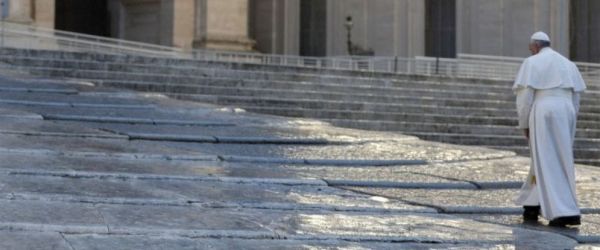"Service" and "gratuitousness" are the two key words around which Pope Francis built his meditation during Mass celebrated at Santa Marta on the morning of Tuesday, 11 June. These are the fundamental characteristics that must accompany Christians "along the way," said the Pontiff, along that path, that "journey" that always distinguishes life, "because a Christian cannot remain stationary."
The teaching comes directly from the Gospel: it is there that we find — as highlighted by the passage from Matthew proposed by the liturgy of the day (10:7-13) — Jesus' instructions to the apostles who are being sent out. A mission which, said the Pope, is also that of "the successors of the apostles" and of "every Christian, if sent". Therefore, first and foremost, "the Christian life is about moving forward, always. Not standing still." And in this journey, what does the Lord recommend to his followers? "Heal the sick, preach that the kingdom of heaven is near, raise the dead, cleanse the lepers, cast out demons." In other words, "a life of service."
This is the first fundamental point highlighted by the Pope: "Christian life is about serving." And it is very sad, he added, to see "Christians who, at the beginning of their conversion or their awareness of being Christians, serve, are open to serving, serve the people of God," and then, instead, "end up serving themselves. This hurts so much, so much to the people of God." The Christian vocation, therefore, is to 'serve' and never to 'use'.
Continuing his reflection, Francis then moved on to a concept that, he emphasised, "goes right to the heart of salvation: 'Freely you have received, freely give'. Christian life is a life of gratuitousness." From Jesus' recommendation to the apostles he sent out, it is clear that "salvation cannot be bought; salvation is given to us freely. God saved us, saves us freely. He does not make us pay'. This is, the Pope explained, a principle 'that God has used with us' and that we must use 'with others'. And it is 'one of the most beautiful things' to know 'that the Lord is full of gifts to give us' and that only one thing is asked of us: 'that our hearts be open'. As in the Lord's Prayer, where 'we pray, we open our hearts, so that this gratuitousness may come. There is no relationship with God outside of gratuitousness'.
Considering this cornerstone of Christian life, the Pontiff then highlighted some possible and dangerous misunderstandings. Thus, he said, "sometimes, when we need something spiritual or a grace, we say: 'Well, now I will fast, I will do penance, I will do a novena...'". All this is fine, but "let us be careful: this is not to 'pay' for grace, to 'buy' grace; this is to open your heart so that grace may come." Let us be clear, in fact: "Grace is free. All of God's gifts are free. The problem is that the heart shrinks, closes and is incapable of receiving so much love, so much free love." Therefore, "everything we do to obtain something, even a promise — 'If I have this, I will do that' — is to enlarge the heart, not to bargain with God... No. With God, there is no bargaining." With God, "only the language of love and of the Father and of gratuitousness" is valid.
And if this is true in our relationship with God, it is also true for Christians — 'Freely you have received, freely give' — and, Francis emphasised, especially for the 'pastors of the Church'. Grace "cannot be sold," he reiterated, adding: "It hurts so much when you find pastors who do business with God's grace: 'I will do this, but this costs so much, that costs so much...'. And God's grace remains there and salvation is a business." All this, he strongly reiterated, "is not the Lord. The Lord's grace is free and you must give it freely." Unfortunately, he explained, in the spiritual life there is "always the danger of slipping into payment, always, even when talking to the Lord, as if we wanted to give the Lord a bribe." But the relationship with the Lord cannot go down "that road."
Therefore, the Pope reiterated, no to dynamics such as, 'Lord, if you do this for me, I will give you that'; but, if necessary, yes to a promise that with it one's heart will be enlarged 'to receive' what 'is free for us'. And "this relationship of gratuitousness with God is what will then help us to have it with others, both in Christian witness and in Christian service and in the pastoral life of those who are shepherds of God's people."
'Along the way': this is how the Pope summed up his reasoning at the end of his homily. 'Christian life,' he said, 'is about going. Preach, serve, do not 'make use of'. Serve and give freely what you have received freely'. And he concluded: "May our life of holiness be this opening of the heart, so that God's gratuitousness, God's graces that are there, free, that He wants to give, may reach our hearts."
[Pope Francis, St. Martha, in L'Osservatore Romano, 11 June 2019]


